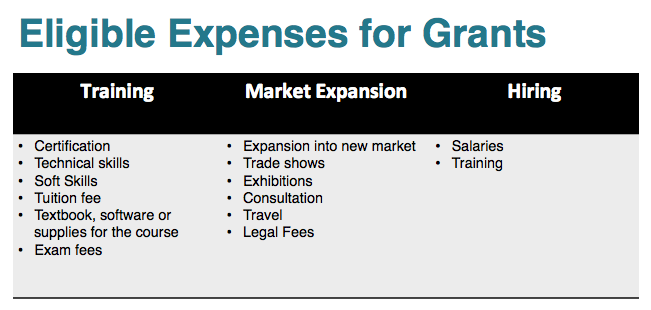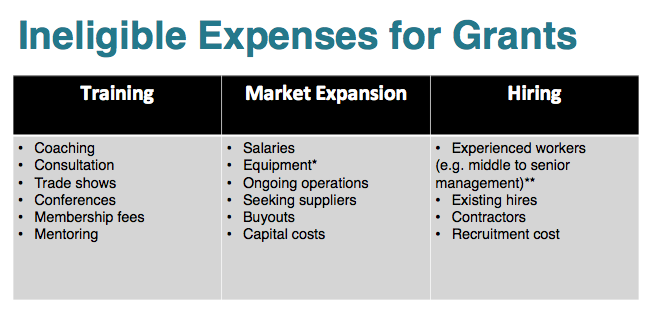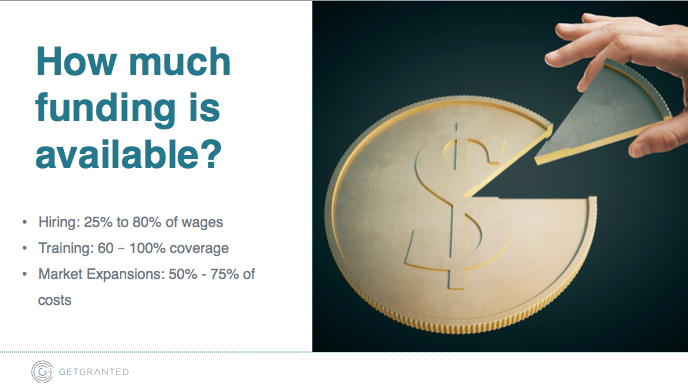Frequently Asked Questions
You can find answers to the most popular questions. If you don’t find something you can always contact us directly.
Granted FAQ
What happens if I don’t follow through with the grant?
Our role at Granted is to secure you the funding agreement and to help out the reimbursement process so that we can ensure that you get the contribution efficiently and the amounts received are accurate. It is your role to carry out the activities proposed. Depending on the service tier, you will either be charged an advisory fee, assistance fee, application fee or a success based fee. Please review the terms and conditions or your contract with Granted Consulting for details.
How much do I need to do?
This varies based on the service package you select:
| Tiers | Your involvement | Details |
| Freemium | 100% | We provide you with an updated list of grants. |
| Basic Plan | 50-100% | We provide grant summaries and best practices and you have the option to access our grant consultants through a pay-per-use service. |
| Premium Service | 20% | This varies depending on which grant you apply for. We manage the entire grant process from research to claim. However, we do need input from your team to ensure strong grant applications. |
How can I stay updated with new grants?
In all 3 of our service packages, you will be notified via email for new and changes to grants that match your business.
Through our Premium Service package, your grant consultants will inform you of new grant that match your business needs throughout the year through quarterly check-ins and annual strategy meetings.
Do you work with companies in our industry?
We work with a range of industries because grants that are often industry agnostic. Check out our blog posts for success stories
What can I get grant funding for?
- Hiring entry-level positions or co-op students
- Investing in external training for staff
- Expanding into new foreign markets (requires min. revenue from last year)
Although GetGranted includes Research and Development (R&D) grant programs, our expertise is in accessing hiring, training, and market expansion grants for our clients. We have partners who can assist with R&D programs and tax credits.
FAQ
What is the turnaround time for receiving a grant?
This varies depending on the grant. Here’s an overview of the timeline for each type of grant:
- Hiring grants: ~2 weeks
- Training grants: up to 3 months
- Market Expansion grants: 3-6 months
- Research & Development grants: 3-6 months
Are grants considered taxable benefits? Where do they go on a corporate tax return?
There is a field in your Corporate T2 Return form for grant funding specifically. It should be considered an offset of expenses as it is calculated as a separate line item in Revenues. Here is a document that may be helpful as there are different circumstances for different grants.
In our T2 Return form, the grant is claimed under Other Income → Other Revenue under GIFI 8230 terms.
For more information on this subject, please consult with an accountant.
How do I know if my business is big enough for grants?
There are grants available for businesses of any size. There is a greater selection of grants for businesses in operation for more than one to two years.
There are some limited grants that solopreneurs qualify for because the government want to verify that you have made it past the two year mark.
You can still apply for grants if you just started your business, but there is a limited selection of grants available. Most new businesses need funding for initial R&D or market research, which grants do NOT cover.
Are there grants that cover my operational costs?
No. It’s on our wishlist too. The government does not support ongoing business operations.
Where are these grants from?
Grants are from the government of Canada, municipalities, and provincial governments. If you are a non-profit or charity, there are also grants through foundations, however these are very different than the grants available for businesses.
What type of grants are there?
Grants that support businesses are often centered on employment, upskilling, market expansion in foreign countries, and research & innovation.


How much grant money can I get?
The grant amount varies on the type of grants.

When is the best time to apply for a grant?
The best time to apply for Canadian grants is just before the Canadian fiscal year – which starts on April 1. So, before April 1, look at the upcoming budgets at both the federal and provincial levels to see what activities your business is doing that align with the upcoming budget. Additionally, consider applying during Q1 or Q4 for slippage dollars—funds not used by other grantees.
How do I find the best grant?
Often times, companies find a grant but they don’t leverage the best one for their business. For example, a clean tech company may be hiring a junior role. They see the first hiring grant ($2800 in wage subsidy) and they apply. Little do they know, there’s another grant for hiring that covers $15,000 of the wage subsidy.
It’s hard to keep up on all the grants available. Grants are our business and we look at grants 24/7 and we have a dedicated research team to keep up with grant changes or new grants. With GetGranted, you can rely on our research team to keep you up to date.
What is the difference between Grants and Subsidies?
Grants and subsidies vary by program. Generally, grants provide a specific dollar amount with less focus on how you spend it, while subsidies often require matching funds from you. For example, you might need to spend a dollar to receive a dollar from the subsidy program. Subsidies are more common than grants, so having initial funding to leverage these opportunities is crucial.
How can I tell what expenses are eligible for my Grant?
Eligible expenses are outlined in the application guidelines and vary by grant. Always check these guidelines to ensure compliance. Many companies assume expenses are covered only to find out later that their claims are rejected. Review your contribution agreement and consult the grant provider before spending if you are uncertain about specific expenses.
What is the most crucial factor to consider before applying for a grant?
The most crucial factor is ensuring eligibility. Applying for a grant without meeting all eligibility criteria results in wasted time and effort. Thoroughly review the application guidelines to confirm you qualify before proceeding with your application.
Can I always secure the maximum funding provided?
While it’s ideal to secure the maximum funding, it’s not always guaranteed. Grant providers may evaluate your application based on fit, timelines, and other factors. Carefully review the guidelines and understand that maximum funding is not assured.
What does it mean when a grant is adjudicated?
Adjudication means your application has been reviewed by someone from the grant provider, compared with others, and a funding decision has been made. Not all applications get adjudicated due to capacity limits, so some may not be reviewed if the program is oversubscribed.
How much preparation is required to complete a grant application?
Preparation varies by grant type. For hiring grants, you need to detail the benefits for your business and the candidate. Training grants require a business case explaining how the training benefits your business and team members. Market expansion grants often require a budget and an analysis of risks and opportunities.
What can I do if a Grant gets rejected?
If a grant is rejected, ask the grant provider why. Understanding whether it was adjudicated or not can help you improve future applications. Sometimes, rejections occur because of insufficient funding, not necessarily due to a weak application.
Which industry in Canada is trending toward more grant funding?
Grant funding trends vary yearly. Currently, clean tech, clean energy, food processing, and forestry are receiving more support. These trends can change based on government priorities, so staying informed about current focus areas is important.
Can I rely on AI to write my Grant Proposal?
While AI can assist, it has limitations. AI-generated content might contain inaccuracies and lacks the storytelling element crucial for compelling proposals. The passion and specific details you provide make a significant difference in the review process, ensuring your application stands out.
What is the basic eligibility to apply for ANY grant?
Ensure your business is properly registered and in good standing with required licenses. Some provinces may also require worksafe or workers’ compensation registrations. Failing to meet these basic requirements can hinder your ability to apply for certain grants.
What do Waitlisted Grants mean?
A waitlisted grant means your application is still being reviewed, but there may not be immediate funding. There’s still a chance for funding if additional dollars become available, such as from other projects that did not use their allocated funds.
What does a retroactive grant mean?
Retroactive grants allow you to apply for funding for activities already expensed from a specific date. For example, hiring grants may allow retroactive claims for wages paid from a certain date. Not all grants are retroactive, so check the guidelines before applying.
How can I get my grant approved faster?
Submit your application early to be among the first reviewed. Being at the top of the submission pile increases your chances of approval before funds are exhausted.
How much in grant funding can my business qualify for?
Use tools like Granted’s grant calculator to estimate potential funding based on your planned activities. This helps identify suitable grant programs and provides an estimate of the funding you might receive.
What is the difference between a grant and a loan?
Grants are non-repayable and non-dilutive, provided to businesses meeting specific criteria. Loans are repayable, typically with interest but do not require giving up business equity. Both options can support business growth but have different implications for your finances.
Are there Grants for Startup businesses?
Startups can qualify for grants, though the number and amount of grants may be fewer compared to established businesses. Programs are available for early-stage companies, but the competition may be higher and the funding amounts lower.
What happens if I do not use all the Grant money?
If you can’t use all the grant money, either apply to reallocate the budget or inform the program of the change. Unused funds can become available for other projects, known as slippage, which may be reallocated to other companies.
What are some tips for writing a compelling Grant Proposal?
Align your proposal with the grant’s mandates, such as job creation or capacity building. Clearly explain how your project meets these goals and provide detailed, compelling arguments to support your case.
Can I apply for Multiple Grants at the same time?
Yes, you can apply for multiple grants simultaneously. However, ensure your organization has the capacity to manage the activities and reporting requirements. Overextending can negatively impact your ability to deliver on grant commitments.
Can advisory/consulting Legal Fees be covered using Grants?
Generally, advisory or consulting fees are not covered by grants. However, if you lack necessary expertise, such as for testing or market expansion, these costs might be eligible. Consult the specific grant guidelines for details.
Can a Grant be renewed or extended?
Extending a grant depends on the alignment with the fiscal year. Projects ending near the fiscal year end have limited extension options. Plan your project timeline accordingly to avoid issues with completion and reporting.
Grants Explained
Hiring Grants
The government is focused on employment opportunities for youth (defined as recent graduates or students).
There are no hiring grants for contractors because the government wants to encourage full-time employment. The grantors usually ask a minimum of 30 to 40 hours per week to ensure that the employment experience meets the purpose of the program. The closest thing to a short-term hire are co-ops or internships positions.
You also cannot use a hiring grant on an existing employee because the government is trying to create MORE job opportunities to boost the economy.
Training Grants
Training grants cover external training for your staff. The training grants varies across provinces, so rules are different. You must be approved before starting your course. Training grants, like most grants, require you to pay upfront and claim reimbursement afterwards. This is a very rewarding grant for business owners to grow and scale themselves and their staff!
Market Expansion Grants
These grants support expansion into new foreign markets. Canadian governments don’t want to support competition within provinces so they would rather encourage businesses to expand to new markets to increase visibility of Canadian products worldwide.
Since market expansion grants are a much higher dollar amount, the government needs to ensure that companies have the capacity to support the market expansion activities and they typically look at the revenue to indicate that. It varies for grants but it usually requires a minimum revenue threshold (approximately $20,000 to $50,000,000) to apply because companies must be able to pay all the cost upfront and get reimbursed after. This is why program grantors usually look at a certain revenue to see if companies can support this.
Quality System Grants
Quality system are types of grants for companies wanting to implement standard operating procedures to meet the industry standards for a particular certification (i.e. TS, ISO, HACCP, etc.) to heighten the quality of their manufacturing process and improve quality and traceability.

